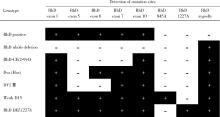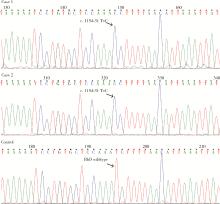Journal of Peking University (Health Sciences) ›› 2024, Vol. 56 ›› Issue (2): 352-356. doi: 10.19723/j.issn.1671-167X.2024.02.024
Previous Articles Next Articles
Molecular biology analysis of 2 rare RhD variant individuals with RHD*DEL37
Peng WANG*( ),Ziyao YANG,Meng WANG,Wei WANG,Aizhi LI
),Ziyao YANG,Meng WANG,Wei WANG,Aizhi LI
- Department of Transfusion, Peking University First Hospital, Beijing 100034, China
CLC Number:
- R446.6
| 1 | Flegel WA , Chen Q , Castilho L , et al. Molecular immunohaematology round table discussions at the AABB Annual Meeting, Orlando 2016[J]. Blood Transfus, 2018, 16 (5): 447- 456. |
| 2 | 杨光远, 朱健, 郑朝晖, 等. 浙江台州地区血清型RhD初筛阴性的血型基因分析[J]. 中国卫生检验杂志, 2022, 32 (5): 555- 558. |
| 3 | 邹彬彬, 谢毓滨, 阳智芬, 等. 湖南省RhD阴性献血人群11种红细胞血型系统基因频率及多态性研究[J]. 中国输血杂志, 2022, 35 (2): 144- 148. |
| 4 |
Zhang J , Zeng Y , Wang Y , et al. RHD genotypes in a Chinese cohort of pregnant women[J]. Front Genet, 2021, 12, 752485.
doi: 10.3389/fgene.2021.752485 |
| 5 | Ding M , Li Q , Zhang H , et al. A novel RHD (c.509T>G, p.Met170Arg) allele shows weakened D expression[J]. Transfusion, 2022, 62 (3): E17- E18. |
| 6 | Wagner FF , Mardt I , Bittner R , et al. RhD PCR of blood donors in northern Germany: Use of adsorption/elution to determine D antigen status[J]. Vox Sanguinis, 2012, 103 (Suppl 1): 15. |
| 7 | Fukumori Y , Hori Y , Ohnoki S , et al. Further analysis of Del (D-elute) using polymerase chain reaction (PCR) with RHD gene-specific primers[J]. Transfus Med, 1997, 7 (3): 227- 231. |
| 8 | 王敏, 王保龙, 蒋光明, 等. Del红细胞膜表面D抗原表位及抗原强度分析[J]. 中国输血杂志, 2011, 24 (1): 23- 26. |
| 9 | 邵超鹏, 徐华, 徐群, 等. 汉族DEL型孕妇可免去抗-D产前检查[J]. 中国输血杂志, 2010, 23 (9): 671- 674. |
| [1] | ZHAO Man-man, ZHANG Yao, BAO Xin-hua. Myoclonus epilepsy with ragged-red fibers: a case report and literature review [J]. Journal of Peking University(Health Sciences), 2015, 47(6): 1034-1036. |
|
||



